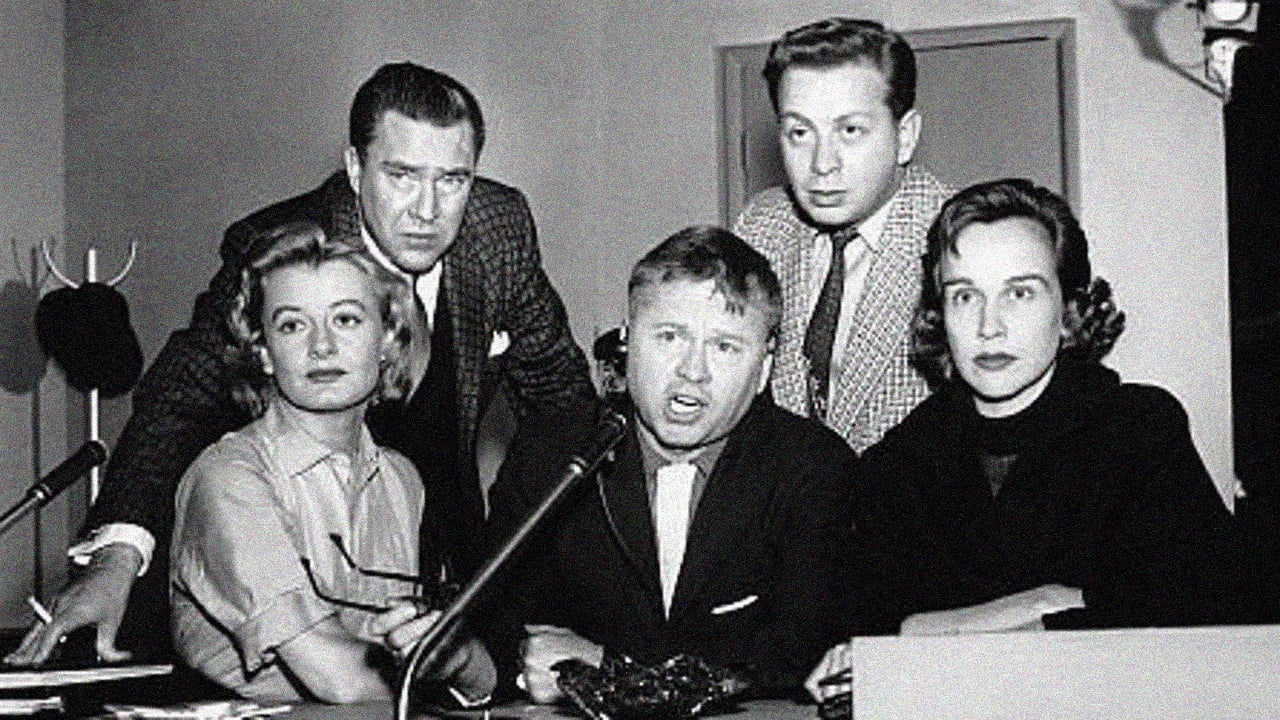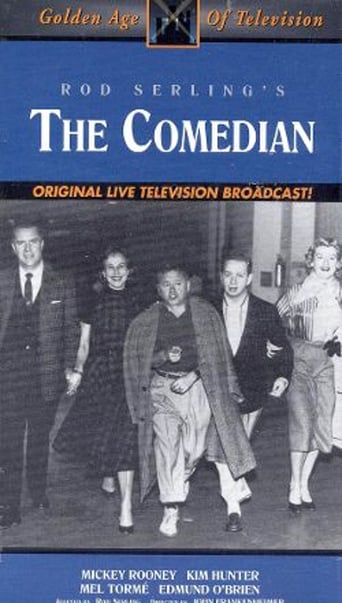

If you pulled out a tape of an old radio drama, and then migrated it to television, this would be a great example. Most of the CBS Playhouse 90 dramas fit this logical mode but what makes them special is the fact they are done live like the old radio dramas were. It helps having a great script which Lehman & Rod Sterlings interpretation here sparkle.Mickey Rooney gives a great performance as the over-bearing comic star who is the boss of his own comedy television show whose over-bearing on his brother & his staff are making everyone pay a toll to him. His ego knows no bounds as is illustrated many times throughout this drama. Rooney is fantastic as his work over the years illustrates the talent he has, but here in particular you understand how much talent he has.The surprise is Mel Torme who plays Rooney's brother. He is the pin cushion in this drama as he has to take everything his brother dishes out including monologues on every show making fun of him. His brother tries to do everything he can to him including putting stress on his marriage. Kim Hunter is here to play that role and she proves again as in other live dramas (Req For A Heavyweight) she did in the 1950's that she is up to the role. Torme & Hunter provide great support here. Edmond O'Brien is great in support as the Head Writer who has his own tormented plot twist here.A small role that I can't find a credit for here is the scandal sheet gossip columnist role who is trying to find dirt on Rooney. That's because either he has a twin brother or this role is filled by an uncredited Richard Basehart. This is a small but important role as this columnist is very much involved in the plot with Rooney's brother & the head writer.This is a high class drama when live drama was the king of prime time in the 1950's. Especially haunting is the huge door with the blow up photo of Rooney on it. It is used to great effect here.
... View MoreThis is one of the teleplays included on the three DVD set from Criterion. All the plays were performed live and it's amazing how good the production values were considering they were put on week after week! Among the films in the set are some amazingly good television events--ones that went on to have expensive Hollywood remakes and in some cases they won Oscars! Such great productions as "Marty", "Requiem for a Heavyweight" and "Days of Wine and Roses" all began first on television--and in some cases this TV version is superior! The basic story idea for "The Comedian" is very, very reminiscent of several other exceptional films from the 1950s. In many ways, it's like José Ferrer's "The Great Man" (1956), Andy Griffith's "A Face in the Crowd" (1957) as well as part of the wonderful film "A Thousand Clowns" (1965) in that all three involve a megalomaniac and downright vicious beloved star--one that America just doesn't know for the jerk he really is.These stories were all were inspired by a real-life event. In the early 1950s, Arthur Godfrey was one of the most trusted and beloved TV personalities--mostly because he came off as so sweet and down to earth. However, in 1953, his anger got the best of him and he actually fired one of his acts ON AIR! And, in subsequent years, his hellish nature became apparent...and his popularity dwindled to nothing. No doubt writer Rod Serling was inspired, at least in part, by Godfrey's example.The comedian from the title is a character played by Mickey Rooney--a huge TV star who has a mean streak a mile wide and takes it out on everyone behind the scenes. He browbeats everyone--but particularly takes it out on his meek brother (Mel Tormé) who is his own personal whipping boy! Mel's wife (Kim Hunter) pressures him to quit--to be a man and stop taking the mistreatment, but his self-esteem is so low that he can't make himself do what he needs to do. In addition to Tormé, a lot of Rooney's wrath is directed to his writer (Edmund O'Brien). Something has to give...as not only these men but everyone who works with Rooney can't stand him and his boorish ways.Overall, it's a very good show--and it's amazing to watch these people doing the show live. However, I must also say that I prefer the films I listed above--they were a bit more subtle and enjoyable--particularly "The Great Man". Still, it's well worth seeing...and an amazing show.
... View MoreSpoilers. See it first.A story in one of those "Whatever Became Of...?" books from several years ago convinced me without aiming to that Sammy Hogarth is a thinly veiled composite of the top two or three TV comics of TV's Golden Age. (No names please.) In that book, a second string comic who did a lot of TV in the 50s talks at length, with deadly, convincing examples, of the bloated egotism, vanity and ugly cruelty of THE names of early TV comedy. "The really big ones" he said "they were all b****rds."That certainly describes Mickey Rooney as Sammy Hogarth to the letter. Once you accept the premise --that over-the-top success breeds monsters of the ego-- it is easy to get swept up in a paranoid who-was-he-really? guessing game. Is Rooney as good as he is at playing Sammy because he IS Sammy? (After all, success and wealth came to him a a very early age, and he apparently had the kind of women most red-blooded American Male's dream of on tap throughout his 20s and 30s.) --Or is it another non-comic air personality, of the legendary and ultimately self-immolating high temper, a saint before the camera, a beast behind the scenes, whose rise and fall was encapsulated for all time in the contemporaneous Face In the Crowd? Clearly, turning over all the stones in the field is madness. Sammy is a postulate. As central as Sammy is to the experience of The Comedian, the story isn't really about him. It's about Al, Sammy's harried head writer, a middle-aged man who finds himself at a personal crossroads. Deep in a lucrative career most of his peers would kill for, he has come reluctantly to the realization that he doesn't have what it takes anymore. His co-writers are carrying him; he is acting mostly as editor, passive catalyst, critic and executive comedy writer. The crushing grind of turning out huge volumes of material on the tightest schedules has used up whatever he may have had. --Or maybe he never had it to begin with; Al is never sure. (Friends say this character was the great Rod Serling himself, always unsure of his own talent.) Whatever his perceived personal inadequacies, Al recognizes and savors brilliance when he sees it. Years before, he crossed paths with an aspiring young comedy writer named Davey Farber. Farber wrote knockout stuff; Al says he (Al) would be dining daily on Farber's dust, were his rival-aborning/idol alive now. But Farber was killed in WWII. Al keeps an original set of Davey's unused, unsubmitted scripts from the old days in a locked drawer in his office. Why? --To commune from time to time with a kindred spirit and dead friend/mentor/demon? --As insurance against the day when inspiration fails him, and he has to come in contact with the Godhead via the service entrance? To steal the work of somebody better than he ever was? Your answer to this question is as ultimately just as crass and condemning or as shaded and empathetic as you want it to be. Al's relationship with the image of Farber isn't exactly love/hate, but it is masochistic, and he probably hates himself for the emotions those scripts bring out in him. Every time he removes those scripts from his hiding place, he bathes in his own failure. He admires Farber immensely, while feeling stung that he could never be one of the brilliant ones, like the long departed author of his hard-copy inspiration. It's his connection with Farber that will eventually put him to the test.Sammy's brother Lester is the comedian's home base foil. For all the abuse Sammy heaps on everyone else-- and that's plenty-- he saves the very best for family, as people will. Lester is the brunt of the savage monologue that opens Sammy's show every week. Lester's wife is beginning to hate him for taking it lying down. He is squeezed tight between the allure of a cushy sustaining spot on his brother's payroll and his wife's impatient shame at a husband who got everything he will ever own by submitting to his brother's public mistreatment. Lester's desperate search for a way out of the non-stop humiliation and threatened end of his marriage sets things in motion that will force Al to finally deal definitively with his dark secret. Into a charged situation sashays gossip columnist Otis Elwood, a dilettante and foppish slimeball, with fur-collared great coat, crisp fedora and shades he never removes. His pompous and high-blown everyday speech betrays his inflated image of himself. But right off, despite all the creep cues thrown our way, we share one undeniable affinity with this 'villain' that prevents us writing him off: We despise Sammy every bit as much as Elwood does. Like him, we ache to see the little weasel fall. It may be hard for modern audiences to realize the kind of power the Earl Wilsons, Luella Parsons, Hedda Hoppers and Walter Winchells used to wield. But they did, and Elwood is no far-fetched deus ex machina. Lester hates Elwood, mumbling into his collar at the beginning of act one "He thinks he's God or somethin'." He will turn to Elwood before the play is over, for leverage against Al and his brother and for salvation from his personal hell.The obsessions of the main characters are essentially Serling's: career (as in how to earn a dollar and retain one's dignity), place in society (as in one's ultimate deemed status in the human community), the nature of talent, and the question of the importance of legacy. In Serling's world, it isn't a question of wanting to fit in and keep up with the other corporation men. Materialistic failure is always an option for Serling. But to be a nonentity, to do something that causes you to slip through the cracks of human memory, is not.If anyone wants to see what all the talk over TV drama from the Golden Age of television is about, this is the place to start.Ten Stars.
... View MoreThis tells the story of an old vaudevillian comic (Rooney) who will do ANYTHING for the show, and at the same time, totally ignore the feelings of his family, particularly his brother (Mel Torme).It is a fascinating production, where Rooney's character, empty of soul, fills the screen with venom and vitriol.Torme, the weaker, less-talented brother, suffers him silently until the end, where he finally loses his grip.I was surprised to see Rooney in such a devastating performance. It makes "Mr. Saturday Night" look like a film-strip.
... View More